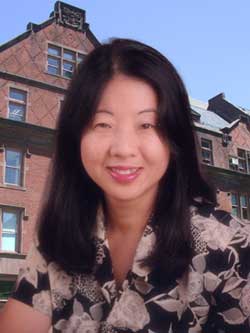Filed Under > Research/Publications
Saying Yes to Science: It's About Attitude More Than Aptitude
TC's Xiaodong Lin will lead a $2.5 million study, funded by the National Science Foundation, that will teach kids that Einstein struggled, too -- and that the brain can change if you work hard
For a nation to remain economically competitive, its young people must pursue careers in the STEM fields – science, technology, engineering and math. Yet many students – and particularly those from minority and low-income backgrounds – opt out of these fields at a very young age, and 60 percent of students who enter college with the goal of majoring in a STEM subject end up graduating in a non-STEM field.
Now Xiaodong Lin of Teachers College, Columbia University, an expert on using technology to influence students’ cognition and learning motivation across cultures and ethnicity, will probe the motivations that lead students to pursue an interest in the STEM subjects. Through a five-year, $2.5 million project funded by the National Science Foundation’s Large Empirical Research and Evaluation On Education in Science and Engineering (REESE) Program, Lin and Stanford University social psychologist Carol Dweck will test the impact of two classroom-based motivational instruction programs on students’ performance in STEM courses: a neurocognitive approach that teaches students about the brain’s plasticity -- that their minds and brains can literally change and grow through hard work; and a social-historical approach that acquaints students with stories of how famous scientists such as Albert Einstein, Sir Isaac Newton and Marie Curie had to struggle to achieve their breakthrough discoveries.
“Our hypothesis is that students’ mindsets – their beliefs about how ability develops through effort – play a key motivational role in their engagement in science,” said Lin, who is Associate Professor of Education in Teachers College’s Department of Math, Science and Technology. “Many students believe that only geniuses can do STEM work and that geniuses do not need to work very hard-- geniuses should be able to solve difficult problems without much effort. The flip side of these attitudes is often the view that if you are not intelligent, no amount of effort will help. So when students struggle in science classes, they see this as a sign that they are not good at science and will never succeed at science. This common attitude severely hinders efforts to increase the number of students pursuing STEM careers.”
The study, titled “Developing Students Growth Mindsets to Promote Science Learning,” will be conducted at 13 schools in the New York City area – most of them low-performing or based in low-income communities – in grades 4 and 9. Some 1,400 students will participate over five years. Both motivational strategies will be facilitated by the use of online interactive multimedia programs.
With women and minorities constituting 70 percent of college students but earning just 45 percent of STEM degrees, “this project may have an even stronger impact on students from groups that have traditionally been under-represented in STEM fields,” Lin said. “The results of our work may also contribute to a reconceptualization of diversity, in which descriptions go beyond demographic variables and include the diversity of values and mindsets that may have a striking impact on students’ academic achievement, particularly in STEM-related subjects.”
Xiaodong Lin, who has received Carnegie Scholar Award, has extensively studied how different types of social cultural knowledge influence students’ motivation to learn STEM and to solve complex problems. Her work, which bridges cognition, motivation, technology and STEM learning, has demonstrated that altering students’ understanding of school goals and what it takes to succeed leads to cascading improvements in motivation and performance.
Carol Dweck is the Lewis and Virginia Eaton Professor in Stanford’s Department of Psychology. Her work spans developmental and social psychology, and examines the self-conceptions (or mindsets) students use to guide their learning. She is the author of Mindset: The New Psychology of Success (Random House, 2006), and has received the 2010 Klingenstein Educational Leadership Award from Teachers College and the 2010 E. L. Thorndike Career Achievement Award in Educational Psychology from the American Psychological Association. She was recently elected to the National Academy of Sciences.
Together, Lin and Dweck seek to foster greater engagement with science learning by employing a variety of innovative instructional and research methods to address learning challenges in the fields of social cognition, cultural diversity and science education.
Published Thursday, Sep. 13, 2012
